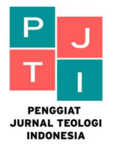Pancasila Sebagai Landasan Visional bagi Spiritualitas Kehidupan Bangsa Indonesia dalam Menangani Intoleransi
Abstract
The new order regime and the reformation era in 1998 were the events of the deterioration of the life outlook of a nation so the abolition of the policy of the dissemination of the value of Pancasila and the UUD NRI 1945 Constitution of the Republic as a visual basis in social. Political and social life. Acts of radicalism and terrorism by radical groups. Psychologically the social community in a dilemmatic position has already left the old belief value, but the value of the new order is not yet available. The euphoria of freedom and reform has led to the emergence of new ideologies that are not necessarily in accordance with the values of the life of the nation and state, one of which is the emergence of religious groups with radical ideologies that encourage violent acts of extremism and terrorism. Based on the description of this condition, the main problem is not yet optimal implementation of the values of the Pancasila in dealing with radicalism and terrorism, thus affecting ideological resilience which ultimately impacts on national resilience. The visual foundation for Pancasila needs to be understood correctly.
References
Amy Zalman. Countering Violent Extremism: Beyond Words. The East West Institute, 2008.
Andrew Kydd; Barbara F. Walter. Sabotaging the Peace: The Politics of Extremist Violence. Vol. Vol. 56. No. 2. International Organization, 2002.
Azyumardi Azra. Islam Politik Radikal Di Indonesia: Akar Ideologi Terorisme. Ditjen Strahan Kemhan: Ditjen Strahan Kemhan, 2012.
Devi Ariyani. Fenomena Gerakan Radikalisme ISIS Di Indonesia: Analisis Isi Terhadap Pemberitaan Media Online Mengenai Gerakan ISIS Di Indonesia. Surakarta: Universitas Muhammadiyah Surakarta, 2015.
Hariyono. Ideologi Pancasila; Roh Progresif Nasonalisme Indonesia. Malang: Instrans Publishing, 2014.
Haryono. Arsitektur Demokrasi Indonesia. Malang: Setara Press, 2013.
Jonathan H. Turner. “Self, Emotions, and Extreme Violence: Extending Symbolic Interactionist Theorizing.” Symbolic Interaction Vol. 30, no. Issue 4. (n.d.).
Luqman Hakim. “Terorisme Indonesia.” Surakarta FSIS, Forum Studi Islam (2004).
Muchamad Ali Syafa’at. Tindak Pidana Teror Belenggu Baru Bagi Kebebasan Dalam Terrorism, Definisi, Aksidan Regulasi. Jakarta: Imparsial, 2003.
Nasir Abas. “Kajian Tentang Terorisme.” Ditjen Starahan Kemhan (January 16, 2012).
Syamsul Bakrie. “Islam Dan Wacana Radikalisme Agama Kontemporer.” DINIKA Vol. 3 No. 1 (January 1, 2004).
Tim Pokja Geo. “Strategi Dan Konsep Ketahanan Nasional.” Lemhanas RI (2016).
Yudi Latif. Mata Air Keteladanan: Pancasila Dalam Perbuatan. Bandung: Mizan, 2014.
“Terorisme Tetap Menjadi Ancaman.” Koran Kedaulatan Rakyat, n.d., edisi 15/11/2015 edition. Accessed April 22, 2016. Koran Kedaulatan Rakyat, Terorisme Tetap Menjadi http://www.krjogja.com/web/news/read/281208/terorisme_tetap_jadi_ancaman.
Copyright (c) 2020 Integritas: Jurnal Teologi

This work is licensed under a Creative Commons Attribution 4.0 International License.
This work is licensed under a Creative Commons Attribution-ShareAlike 4.0 International License.
Copyright © Integritas: Jurnal Teologi 2020. All Rights Reserved.









.png)


